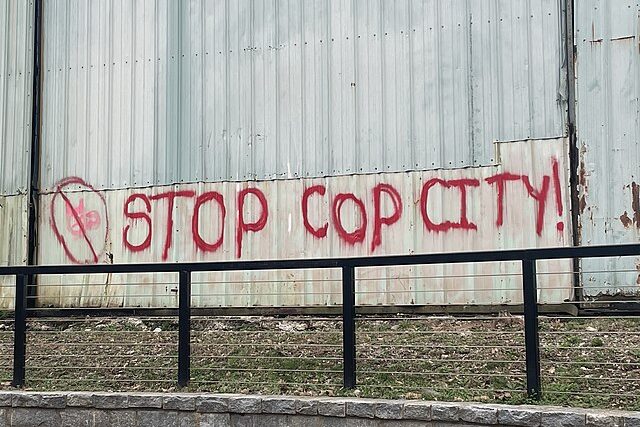Secrets of the Heartland: The battle to see inside Iowa’s factory farms
Iowa’s war against factory farm investigators.
Jeremiah Scanlan
August 9, 2022
Erin Wing can still remember what it was like to see a young cow dehorned in front of her, when she was working at a dairy farm in Pennsylvania. As a worker pressed a hot iron into the calf’s horn bud, the calf would bellow and struggle against its restraints. The image, the sounds, and the smell of burning flesh are still vivid in her memory. “Things like that,” she says, “they stay with you.”
Yet witnessing the horror of dehorning calves without anesthetic was the very reason that Erin was at that farm. She wasn’t just there as a worker—she was also there as an undercover investigator.
The work of being an undercover farm investigator is exhausting in every sense of the word. As employees of the farms they are investigating, investigators perform the same tough physical labor as their fellow workers, rising early for shifts that can be fourteen hours long, herding livestock that can weigh several times what they do. The work is often lonely, in far-flung parts of the country, distant from friends or family. There is the emotional and mental stress of being exposed as an investigator. And, above all, there is the emotional and mental toll of the animal cruelty they are there to document. At night, an investigator must sift through the footage they have gathered, then prepare to return to the facilities the next morning, unsure of what fresh horrors will be greet them.
For animal welfare advocates like Erin, dehorning calves without anesthetic is just one small example of the cruelty that happens every day on farms across the country. Pigs, chickens, cows, and other animals endure painful, torturous, and sometimes downright bizarre practices in the sheds, barns, and slaughterhouses that produce our food. Yet most Americans are unaware of these practices. “There’s so many roadblocks that the animal agriculture industry puts in place to prevent people from seeing that,” Erin says.
“There’s so many roadblocks that the animal agriculture industry puts in place to prevent people from seeing that.”
Undercover investigations are one of the only ways to get around the industry’s roadblocks. Organizations from the Humane Society to Mercy for Animals have long used investigators to get a look inside farms. Equipped with wearable cameras, the footage they gather can be invaluable to shaping public opinion. In some cases, undercover investigations can even spark criminal prosecutions.
Erin, now Deputy Director of Investigations at Animal Outlook, sees footage as one of the most important tools advocates have. “We can look at a big number and say ‘three million chickens were killed at this particular facility,’” she says, “but it’s not the same thing as seeing how the chickens were killed, and in what way, just the brutal reality of it…it has that ability to put people in that place where they hadn’t been able to see that before.”
“We can look at a big number and say ‘three million chickens were killed at this particular facility,” she says, “but it’s not the same thing as seeing how the chickens were killed, and in what way, just the brutal reality of it…it has that ability to put people in that place where they hadn’t been able to see that before.”
Take the example of Liz Pachaud, who went undercover at a hog farm in Iowa in 2011. In the mere three months that she was there, she had gathered footage of piglets being slammed into a concrete floor, piglets squealing as their tails were cut off without anesthetic, and stressed sows gnawing at the iron bars of their confining cages. After the news broke, several retailers, including Kroger and Costco, cut ties with the pork producer that owned the farm.
Liz Pachaud’s story is emblematic for many reasons. For animal advocates, the cruelty is simply par for the course in America’s modern system of animal agriculture. (Mercy for Animals says that the farm Pachaud investigated was randomly selected.) It is also a story of hope for advocates—that with the right tools, they can reveal the system for what it is and bring public pressure to bear on the corporations that create it.
Her story is also emblematic because of where it took place. The hog farm Pachaud investigated was owned by Iowa Select, Iowa’s largest pork producer. Iowa is the number one pork producing state in the country, making Iowa Select one of the country’s largest pork producers. Iowa is also the number one state for egg production. Animal agriculture in Iowa is important not just to Iowa, but to the entire country. Not unlike its presidential caucuses, what happens in Iowa’s farms and slaughterhouses can send a signal to farmers from coast to coast.
Which is why the aftermath of Pachaud’s story is also emblematic as a warning to animal advocates. If she wanted to perform a similar investigation today, she probably couldn’t. Iowa has made it a crime to do so.
__________
Farms like the one Liz Pachaud worked on have flourished in Iowa since they started to expand in the 1990s. With liberal use of antibiotics and a system that collects waste into nearby lagoons, these new farming operations were able to house thousands of hogs in confined spaces. This new kind of farming facility needed a new name. Thus was born the “factory farm.”
Before factory farms, smaller farms raising a few hundred hogs used to be the norm. Now, about a fifth of Iowa’s farms raise over ninety percent of the state’s 23 million hogs. Pigs outnumber Iowans seven to one. Iowa’s pork producers claim that one in ten jobs in the state are tied to the pork industry. And pork hasn’t just become one of the dominant agricultural operations in Iowa. As the number one pork producing state in the country, Iowa raises over a third of hogs nationwide.
The rise of factory farming in Iowa reflects a trend across the country. Since 1990, the proportion of all agricultural production coming from small and medium-sized family farms has dropped from fifty percent to just twenty-five percent. In Iowa, as in other states, family farmers look out their windows to see their neighbors’ houses empty or taken over by bigger operations.
In Iowa, as in other states, family farmers look out their windows to see their neighbors’ houses empty or taken over by bigger operations.
Yet as factory farming continues to expand in Iowa, the state legislature has made it more difficult for undercover investigators like Liz Pachaud or Erin Wing to discover what those operations actually look like. In 2012, Iowa passed a law that made it illegal to gain access to an agricultural operation under false pretenses. In other words, doing exactly what Liz Pachaud did.
Iowa hasn’t been the only state to pass a law like this. In fact, laws like this one have a nickname: “Ag-gag” laws. Ag-gag laws have been considered by dozens of state legislatures, and a handful of states have even passed them into law. The laws come in a variety of flavors, but they all have the same purpose: to prevent undercover investigators or the public from seeing what’s going on in factory farms.
Ag-gag laws also share something else in common: courts have consistently struck them down for infringing on free speech. A federal court first found an Idaho Ag-gag law unconstitutional in 2015. In the ruling, the judge wrote that undercover investigations “advance core First Amendment values by exposing misconduct to the public eye and facilitating dialogue on issues of considerable public interest. This type of politically-salient speech is precisely the type of speech the First Amendment was designed to protect.”
Ag-gag laws also share something else in common: courts have consistently struck them down for infringing on free speech.
Since then, courts have struck down Ag-gag laws in four other states, including a Utah law that had been used to arrest an activist for filming a farm from a public road. Iowa’s 2012 law was among them. In 2019, a federal court struck it down for violating free speech.
But 2019 was also the year that Iowa’s story started to look different. Other states took their defeats and retreated from the field. Public opinion frowned on Ag-gag laws, and they floundered in state legislatures. But not in Iowa. Just months after their first Ag-gag law had been struck down, the Iowa legislature passed a second Ag-gag law, dubbed “Ag-gag 2.0” by its critics, that was very similar to the first one. Then, in 2020, Iowa passed Ag-gag 3.0. And in 2021, Iowa passed Ag-gag 4.0.
Only a handful of states have passed Ag-gag laws since courts began to strike them down. Only one other state, Missouri, has successfully passed a second Ag-gag law. No other state than Iowa has passed four.
__________
Critics of Ag-gag laws say that undercover investigations play an important role in uncovering animal abuse and exposing cruel conditions on factory farms. They have plenty of evidence to point to.
At a chicken farm in Nebraska, undercover investigators found hundreds of thousands of birds crowded into sheds and living in their own waste. Bred to grow large, quickly, some chickens died from heart failure or after they were flipped onto their backs, unable to turn themselves back over. Many did not even survive to become adults, born with deformities or trapped in feeders. Investigators described walking into sheds where the air stung of ammonia and excrement. The farm is owned by Costco and is one of the suppliers of Costco chicken.
At a dairy farm in Southern California, an undercover investigation found workers beating cows with wooden canes and metal rods to get them into position at automatic milkers. Sick and injured cows, unable to move easily on their own, were often dragged through the facilities by tractors. Other sick cows were simply left to die from exhaustion, starvation, or disease.
These do not appear to be isolated incidents. Investigations uncover similar cruelty at farms all across the country, every year. Many of these practices are common in the industry—in fact, because they are “common industry practice”, they are not considered to be unusually cruel under the law. The investigations’ findings are frequently covered by major news outlets, and footage has even found its way onto the New York Times editorial pages. And as consumers become more aware of what happens to their meat before it hits their plate, some have started to demand that farms change their practices. In 2011, an investigation revealing cruel conditions for hens at Sparboe Farms facilities led McDonalds and Target to cut ties with the company, which had been an egg supplier.



